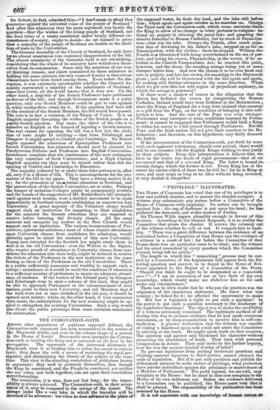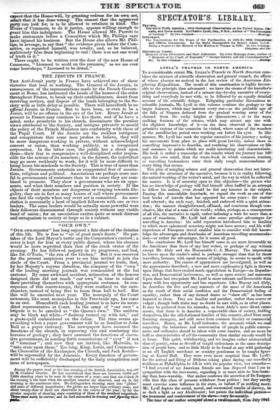"PRIVILEG-E." ILLLTSTRATED:-
THE House of Commons has voted that one of its privileges is to hear and-publish.slanderrandta protect the slander-mongers. A witness- may calumniate any person before a Committee of the House of Commons with impunity. No action can be brought against him : the cap of darkness is put -upon his -head; has gathered thefern-seedrand walks unseen. of' Alsace.. Sir Thomas Wilde argues plausibly enough in favour of this. decision. According to the learned Sergeant, it lain- reality. the Committee that utters the slander. It screws the calumny out of the witness whether he will or not. It compels.him.to back- bite. " There was a great difference between the evidence, of am individual- before a Committee of that House 'and the evidence of- a witness in a court of law,: for before the-Committee-of that House -there was no particular. issue to be ,tried. and the witness had- his mind ransacked by. every question which the Committee pleased, being-left no option." The-length, to which this "ransacking:" process' may, be car- ried by a Committee of the, Legislature will appear from the fol- lowing question and answer, to be found in the Notes of Evi- dence appended to, the Report of a Committee of the Peers. "Should you think he ought to be designated as a respectable man 1"—"I- am in possession of one or two facts of my own knowledge, which would make me clidielieve him on his oat& under any circumstances."' There can-be little doubt that he who put ,the question. wee the: originator 'of the slanderous statement. He knew what was coming ; he fished for it ; he. afforded the opportunity .to make it. But has a legislator a right, to put such a question?" Is, the power to put such a question' necessary to-the. discharge of his legislative finictions? The object was to shake the credibility of a witness previously examined. The legitimate method of ef- fecting this was to produce evidence that he had made erroneous statements, or by cross-examination to involve him in self-con- tradiction. A general declaration that the witness was capable of stating .a falsehood upon oath could not assist the Committee in arriving at the truth. He might speak truth on that occasion. The question and answer only blackened his. character-without promoting- the elucidation of truth. They rank. with personal.; vituperation in debate: They only invite to- the further inquiry„ how far was the accuser himself worthy of belief ?'
To prevent legislators from putting irrelevant- questions and' eliciting answers injurious to third parties, cannot obstruct the" ends of legislation. But if to put such question's and publish the defamatory answers be made matter of privilege, what protection have private individuals against the petulance or malevolence oi a Member of Parliament? The party injured, we are told, may complain to the House : but he must in that case complain to the House of its own deliberate act. Before the evidence delivered. to &Committee can be published, the House must vote that it shall be printed. The responsibility of the publication has been assumed- by-the House.
It is. net consistent with our' knowledge. othuraan nature 110' expect that the House will,. by granting redress for inn own. act, admit that it has done wrong. The utmost that the aggrieved' party can leok for, is to be allowed to retaliate in kind. The House of Commons to do it justice, appears.willing, enough to grant him this indulgence. The House allowed Mr. Parrott to make statements be Ore a Committee which Mr. Phillips says have injured his business. But the House also allows Kr. Phil- lips; in 1;evenge, to say that-" the evidence given before the Com- raittee, as regarded himself,- was totally, and, as he believed,- Maliciously false from beginning to end : there was not one word of truth in it.'
There ought to be written over the door of the new House of Commons, "Licensed to scold on the premises," as we see over some beercshops, "Licensed to be drank."



























 Previous page
Previous page